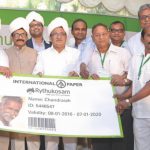
ITC had initiated talks with the state government through its Bhadrachalam-based paperboard and speciality papers division
April 8, 2016
The government of Madhya Pradesh says it has grand plans for bamboo, hitherto the poor man’s timber. Through a Global Bamboo Summit planned from 8-10 April, in Indore, the state authorities would try to gather ideas on how bamboo can replace teak or be knocked on to floors or roofs or used as a high-price fetching commodity. And, wants to attract private investment in the sector.
After the northeast states, MP is the second largest bamboo producer, with 12 per cent of the growing stock. “We have 10 per cent of the total bamboo forest of India. However, management of these is a tough task. More, bamboo is a wild species, not grown privately. This is why the MP government has been active in the National Bamboo Mission since 2013 and through the global summit, we want to encourage private players to invest in the sector,” Gaurishankar Shejwar, the state’s forest minister, told a newspaper.
According to the Forest Survey of India’s report of 2011, the state has 13,059 sq km under bamboo but 42 per cent of this is degraded land. “There is a demand-supply gap in bamboo, at 90 per cent,” said Deepak Khandekar, principal secretary of the state forest department, “Harvesting of bamboo from natural forests creates 2-2.25 million man days employment or Rs 112.5 million wage earnings. In other words, a bamboo plantation can produce 200 mandays of employment. It would be 900 mandays in cottage industry like incense stick manufacturing or handicraft making that receive raw material from this plantation. The requirement is huge and, hence, there is a need to attract private investment in the sector.”
Traditionally, bamboo has had only two consumers in this state – for ‘nistar’ (specified forest produce for domestic use) users and for Bansods, an artisan community that make household items and handicrafts from bamboo. “The total requirement from these communities is nearly 200 million units. The commodity fetches nearly Rs 3,000 a tonne against national and international prices of Rs 10,000-12,000 a tonne, as these two domestic users are poor and cannot afford high prices,” said Khandekar.
According to state forest department data, if each Bansod family is provided 908 units of bamboo and 1,500 bamboos goes to each farmer family under Nistar policy, 52 per cent and 77 per cent, respectively, of these two categories can go above the poverty line. Forest department data also says the area under degraded forest has increased considerably, to 267,000 hectares. Of the state’s 10 revenue divisions, there is no bamboo grown any more in five.
ITC, the private conglomerate, had initiated talks with the state government through its Bhadrachalam-based paperboard and speciality papers division. After year-long discussion in 2005, it dropped the idea. The state has since amended its forest policy to attract more private investment.
The company had wanted to set up a pulp and paper mill on the social forestry model. “We have hopes that experts from various parts of the globe would share new ideas in the Global Summit, to pave the way for sustainable development or a workable economic model for private players which can invest in bamboo cultivation, processing, trade and exports,” the forest minister said.



